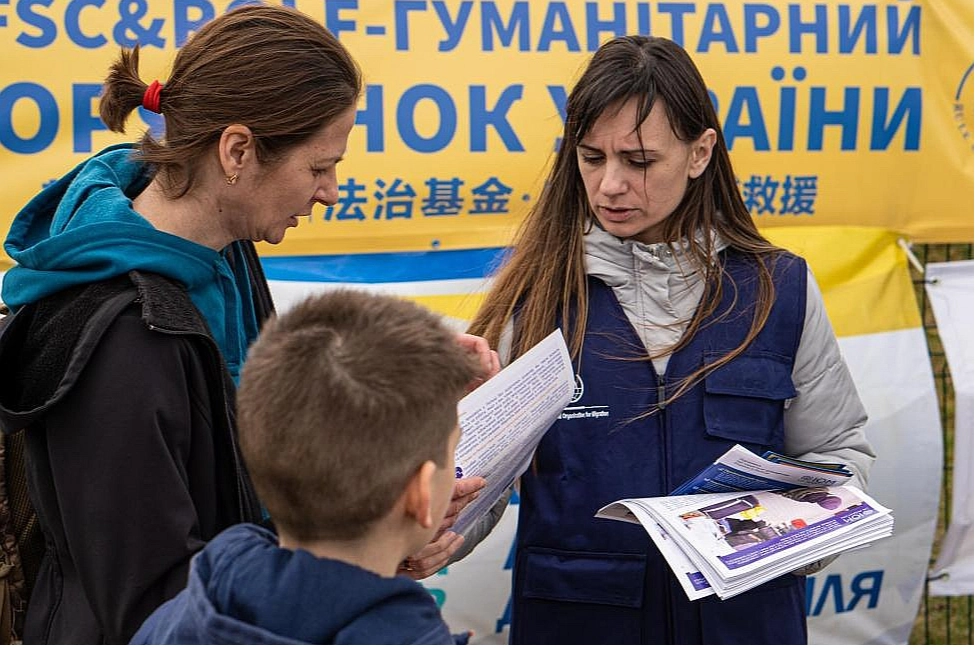Gabrielé Navickaité/ Latvijas Avīze
In 2022, when Russia launched a large-scale invasion of Ukraine, Lithuania welcomed more than 95 000 war refugees.
In the first months, the country provided emergency assistance, taking care of accommodation and basic needs. Today, this assistance has evolved into a long-term integration system: there are currently around 40 000 Ukrainians working in Lithuania, and in three years, their taxes have contributed EUR 377 million to the state budget, confirming that many have successfully established themselves and integrated into the Lithuanian economy.
According to data from 2025, the number of war refugees from Ukraine in Lithuania has decreased – with 77 000 Ukrainians currently registered. According to data from the Migration Department, the situation has changed significantly in three years. “Some returned to their war-torn country, while others chose to continue their lives in other countries,” said Rokas Pukinskas, a representative of the Migration Department.
Ukrainian war refugees in Lithuania have temporary protection status, which gives them the right to live and work in the country and use social, health care, and education services under the same conditions as Lithuanian citizens.
In 2024, research conducted in Lithuania on behalf of the United Nations Refugee Agency showed that although Ukrainian refugees are increasingly integrating into the labour market and society, their lives are still marked by various difficulties – language barriers, complicated paperwork, and unstable working conditions, especially for single mothers.
The research shows that most Ukrainians in Lithuania are no longer temporary guests, but people who are building a new life and plan to settle in the country.
The need for support is decreasing
According to data from the Ministry of Social Security and Labour, the greatest need for humanitarian aid, housing, and social assistance was in 2022, when a large part of the costs were financed by the European Union. In recent years, the need for support has decreased as a large number of refugees have already integrated into the labour market. However, such assistance is still needed for socially vulnerable groups – children, people with disabilities, and newcomers. In 2024, approximately EUR 40 million was allocated from the Ministry’s budget for this assistance, and in 2025, EUR 23.8 million was allocated by 1 September.
The Reception and Integration Agency, together with Caritas and the Red Cross, provides initial assistance to newly arrived Ukrainians – food, hygiene products, and benefits.
Currently, local governments provide free accommodation for up to six months, until refugee status is confirmed and a residence permit is issued. After receiving a permit, refugees can access social support under the same conditions as Lithuanian citizens. To promote independence, they are granted a one-time settlement allowance of approximately EUR 330 per person, and kindergarten fees are reimbursed for up to six months for each child. The Ministry notes that childcare support is particularly important for single mothers who have difficulty entering the labour market due to the need to care for young children.
The biggest problems – the language barrier and psychological state
The Employment Service notes that since the second half of 2022, the support system for Ukrainians in Lithuania has become more focused on long-term settlement. Refugees are offered free Lithuanian language courses, career counselling, and assistance in finding work.
Currently, more than 40 000 Ukrainians are working in the country, and nearly 34 000 of them have found jobs with the help of the Employment Service. Since the start of the war, 10 000 people have participated in various employment courses, half of whom have learnt Lithuanian. According to the data of the Service, 68% of those who completed language courses found work within six months.
However, refugees face many difficulties when integrating into the labour market.
“The language barrier is still the most frequently mentioned obstacle,”
notes the Employment Service. Refugees also point out that it is difficult to combine family responsibilities with work, especially for single mothers. The specialists at the Service also draw attention to the poor psychological state of some people: “After more than three years of war, some clients experience fatigue and stress, which affects all aspects of their lives, including work,” say representatives of the Service.
The specialists emphasise that their goal is to ensure that Ukrainians are employed not only in lower-skilled jobs but also in higher-skilled positions, and they encourage them to participate in free training and small business programmes.
Since 2022, the number of students has decreased by more than a third
The education of Ukrainian children is provided by local governments, which are funded by the Ministry of Education, Science and Sport (MoES) on a per-class basis. Teachers who work with Ukrainian children receive additional benefits. The Ministry notes: “The situation is constantly changing, as families with school-age children arrive throughout the year, while some leave Lithuania.”
Ukrainian children also have the opportunity to learn Lithuanian and participate in extracurricular activities.
“All 60 local governments created conditions for children to participate free of charge in both informal children’s education and art and sports school programmes. Local governments have also created conditions for Ukrainians to participate in summer camps, with some local governments compensating the full cost of the camp,” said representatives of the Ministry.
Ukrainian citizens who have completed secondary education in Lithuania can apply for state-funded places at higher education institutions under the same conditions as Lithuanian citizens. Students from lower-income families may also be eligible for housing allowances and preferential loans.

